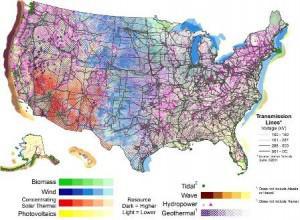 The National Renewable Energy Laboratory (NREL) recently released a technical potential report for the entire United States that gives a solid limit to the amount of renewable energy generation that can be achieved. Technical potential refers to the amount of energy a certain technology can produce while observing technological, land use, and environmental constraints. By understanding the potential of renewable energy, we can then understand how great of a deployment will be needed to reasonably curb our growing fossil-fuel consumption.
The National Renewable Energy Laboratory (NREL) recently released a technical potential report for the entire United States that gives a solid limit to the amount of renewable energy generation that can be achieved. Technical potential refers to the amount of energy a certain technology can produce while observing technological, land use, and environmental constraints. By understanding the potential of renewable energy, we can then understand how great of a deployment will be needed to reasonably curb our growing fossil-fuel consumption.
The report takes a Geographic Information Systems (GIS) approach to finding renewable energy potential and came up with some surprising estimates. For reference, the United States currently has roughly 48 gigawatts (GW) of installed wind power capacity. Understanding this, it is exciting to see just how much energy can be gained from renewables alone. The report found that there is the potential for 11,000 GW onshore wind, and another 4,200 GW offshore wind. Concentrating solar power has the potential to generate 38,000 GW, and rural utility-scale photovoltaic has the potential for a whopping 153,000 GW of power. Just 1 GW of solar alone can power 750,000 homes.
Considering all renewable resources, the total energy generation from this capacity reached 481,800,000 gigawatt-hours (GWh) annually. In 2010, the United States consumed about 28,720,000 GWh of energy across all sectors, including residential, commercial, industrial, and transportation. This is promising news, seeing that renewable energy does have the potential to cover our consumption needs, but as I have made the case in my recent posts Planning and Execution Before the Storms Hit and Renewable Energy’s Inconvenient Truth: Scale, it is much more difficult to actually build the renewable energy infrastructure than it is to map its potential.
The website to access the report, maps, and data can be found here: http://www.nrel.gov/gis/re_potential.html
Image URL

